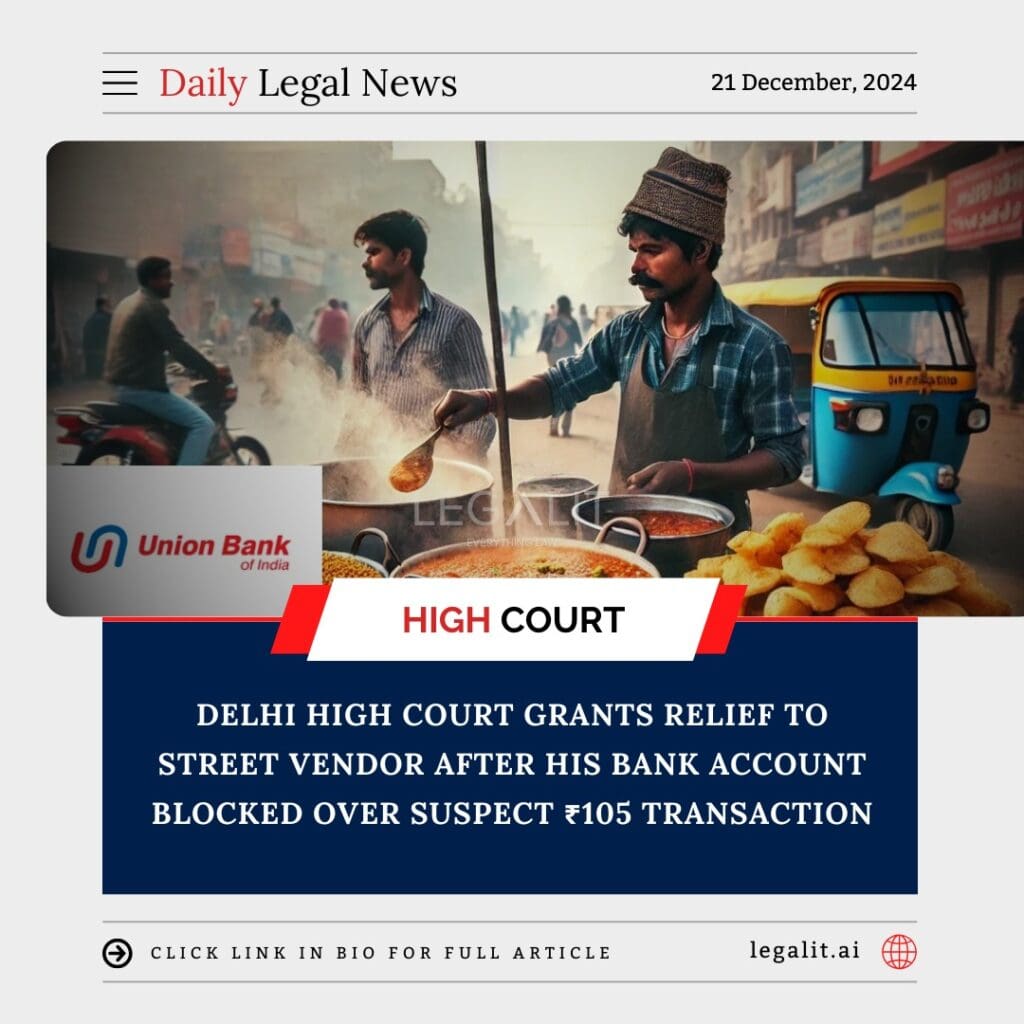
In a recent judgment, the Delhi High Court granted relief to a street vendor whose bank account was blocked due to a ₹105 transaction flagged by the bank as suspicious. The case highlights the challenges faced by small vendors and individuals in the informal economy, where even minor transactions can result in significant legal and financial complications. The court’s intervention has brought attention to the need for more streamlined and reasonable processes for such individuals when dealing with financial institutions and regulatory authorities.
Background
The street vendor in question had his bank account frozen by the bank after a ₹105 transaction was marked as suspicious. The transaction, which was relatively small in value, raised alarms due to certain banking protocols that triggered the suspicion. However, the vendor, who relies on this account for his livelihood, was left unable to access his funds, causing considerable distress. He filed a petition before the Delhi High Court, seeking immediate relief and requesting the unfreezing of his account. The case raised important questions about the disproportionate impact of banking regulations on small-scale businesses and individuals in the informal sector.
The vendor argued that the freezing of his account based on a minimal transaction was unjustified and that the matter could have been addressed through a more measured approach. His legal counsel pointed out that such actions could severely harm individuals who do not have the means to challenge large institutions, ultimately affecting their ability to conduct basic financial transactions.
Key Arguments
Disproportionate Action Over Small Transaction
- Injustice to Small Vendors: The petition highlighted the disproportionate impact of freezing a bank account over a ₹105 transaction, particularly for individuals in the informal sector who rely on small transactions for their daily sustenance. Freezing an account over such a minor issue not only disrupts their business but also undermines their basic rights to access funds.
- Lack of Clear Communication: The vendor also raised concerns about the lack of clear communication from the bank regarding the reasons for the suspension of the account. Without adequate explanation or opportunity for resolution, the vendor was left with no recourse, which further exacerbated the situation.
The Need for a More Transparent Process
- Efficacy of Automated Alerts and Flags: Another key argument was that while banks have protocols in place to detect suspicious activities, these systems should be refined to distinguish between genuine concerns and minor irregularities. Relying solely on automated alerts without proper investigation can result in unnecessary disruptions to the financial lives of individuals.
- Transparency and Accountability: The case also stressed the need for greater transparency in how banks and financial institutions handle suspicious transactions. Individuals should have access to clear guidelines and a fair process to appeal or contest such actions.
Legal and Policy Implications
Banking Regulations and Informal Sector
- Impact on Small Businesses: This case underscores the difficulties that small business owners and individuals in the informal economy face when dealing with formal financial institutions. While anti-money laundering and financial crime regulations are crucial, there needs to be a balance between security and the practical realities of small-scale vendors who rely on basic banking services.
- Call for Regulatory Reforms: The case highlights a need for regulatory reforms that take into account the realities of small vendors and entrepreneurs in the informal sector. Policymakers may need to consider creating mechanisms that ensure financial institutions do not disproportionately affect individuals with minimal means or those whose businesses are not involved in large-scale transactions.
Conclusion
The Delhi High Court’s decision to grant relief to the street vendor brings attention to the broader issue of how small vendors are affected by banking practices. While financial institutions are required to maintain stringent checks to prevent fraudulent activities, the case emphasizes the importance of implementing these measures in a way that does not unjustly harm individuals who may have limited financial resources. The court’s ruling could serve as a reminder to banks to adopt more nuanced and transparent methods when dealing with customers, particularly those from marginalized sectors, and encourage policy changes that better protect the rights of informal sector workers.